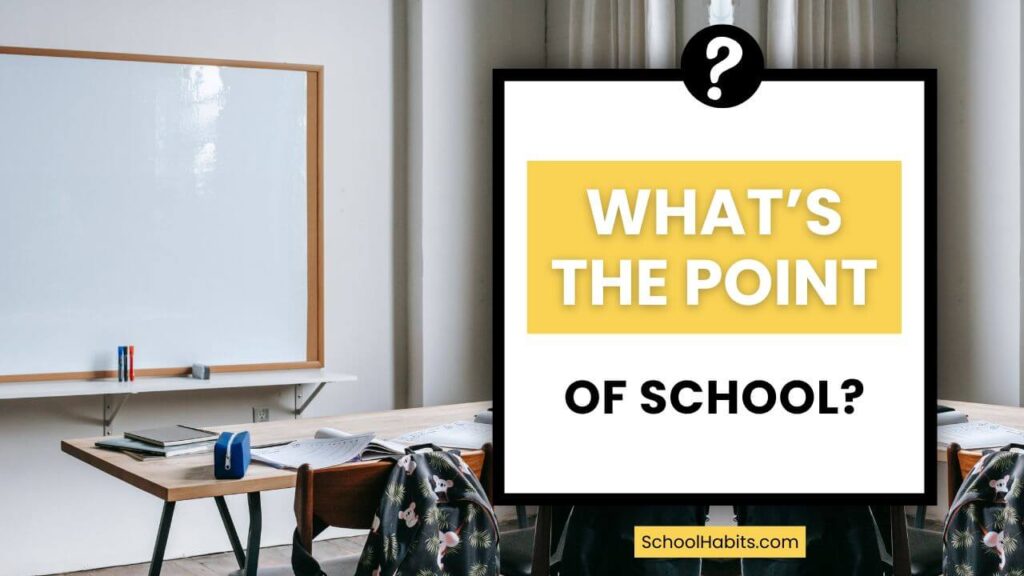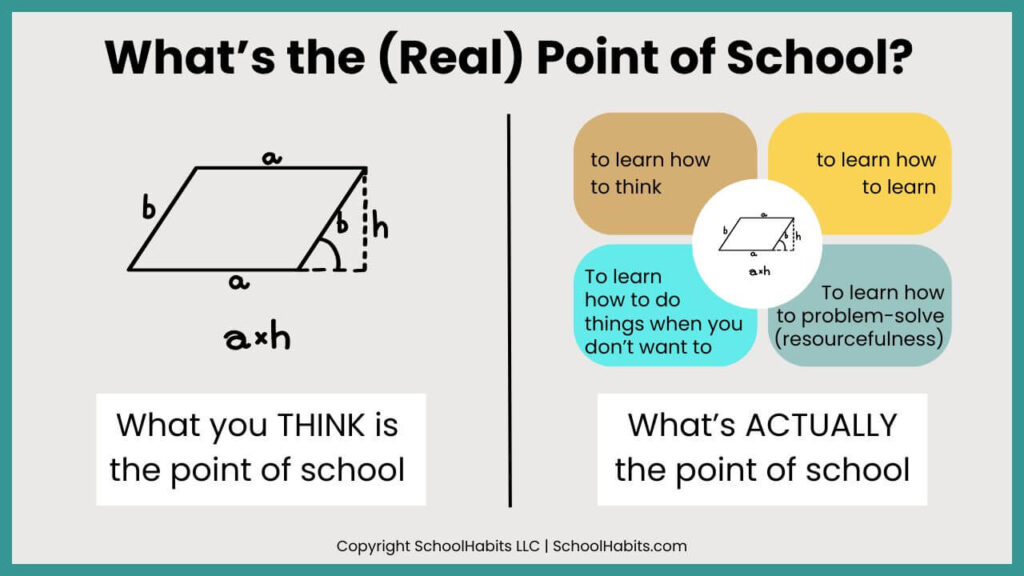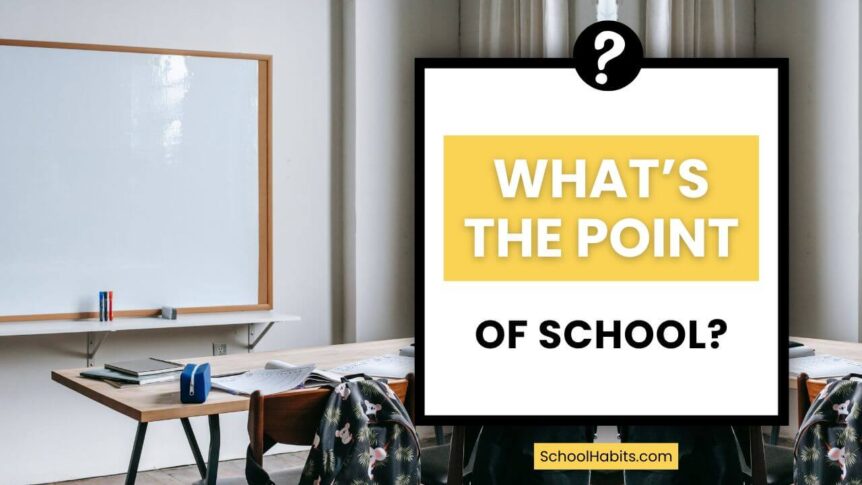
By Katie Azevedo, M.Ed.
I’ve seen this one particular meme a few times now. It’s funny, and I appreciate the humor behind it.
Here’s the two-sentence meme: “I’m really glad I learned about parallelograms in high school math instead of how to do my taxes. It really comes in handy during parallelogram season.”
Again, I think the meme is funny and it has a point. I agree that some high school curricula could be replaced with more relevant content.
However, as a lifelong educator, I can’t help but read the meme and think Wait! There’s a reason high schools teach parallelograms that has nothing to do with parallelograms! It’s not pointless!
In this blog post, I aim to answer the question: What’s the point of school?
I’m exploring this topic because I have many conversations with students who are losing motivation for school. They’re losing interest. Why? Because they’re focusing on the wrong thing. They’re so focused on the parallelogram’s practical irrelevance that they miss the real point behind the lesson.
And the real point is what we’re talking about here.
What’s the (Obvious) Point of School? Let’s Start Here …
Don’t get me wrong — a standard high school curriculum has a ton of value.
It’s important to learn about historical events so we don’t repeat our mistakes.
It’s critical to learn how to read and write so we can be functional adults.
It’s essential to learn the basic principles of science so we can remain progressive.
And it’s imperative that students get exposure to a wide variety of content areas so they can determine what they like and don’t like. This will in turn lead to choosing the right college and a satisfying career.
(How else would a teenager discover their love for chemistry if they weren’t exposed to chemistry in high school? That’s not something likely to be “stumbled” upon.)
But, with all that said, I believe the most valuable lessons from four years of high school come from the PROCESS of learning, not just the content itself.
In other words, it’s not parallelograms that really matter — it’s what we get from the process of learning about parallelograms that matters. The struggle, the resourcefulness, the figuring-it-out bit, the “how do I think about this?” bit … THESE are the lessons that matter. THIS is the real point of school.
So, What’s the (Real) Point of School?
The list below includes what I argue is the real point of school. You may agree with me, or you may not — that’s all okay.
If you came to this blog post thinking there is no point of school … all of it’s useless, then I challenge you to shift your focus. Shift your focus away from CONTENT and onto the REAL lessons, which I outline below. That’s where you’ll find the relevance.
To Learn How to Think
Think about this: If there were no school, where else would you learn how to think? Where else would you learn how to form thoughts about new information in a safe environment with people who are also doing the same thing?
Critical thinking skills aren’t something we’re born with. They’re something we develop whenever we’re exposed to different experiences. And school is one of the only places where this development is structured and intentional.
When you analyze a text, work through a math proof, or study a historical event, you’re growing your thinking skills. You’re learning how to look closely at information, spot patterns, question assumptions, and form connections between ideas.
Even if you never again calculate the area of a parallelogram, learning HOW to approach and solve that problem develops the thinking skills you’ll use in every other part of your life.
School gives you multiple chances every single day to practice thinking about things. You’re surrounded by other people who are also practicing thinking about things. You have a guide (the teacher) supporting you and demonstrating how to think.
You’re given writing assignments to organize your thinking into clear written arguments. I’ve heard hundreds of students complain that “this essay on The Great Gatsby is so useless” or “I don’t get why we have to write a pointless essay on Beloved.” If you’ve thought similar thoughts, you’re missing the entire point.
Writing is the ultimate way to organize your thinking. In high school, writing assignments aren’t so much about writing as they are about teaching you how to develop a point of view on a topic. Again, the point is not the TOPIC, it’s the SKILL you’re learning. The point isn’t The Great Gatsby — the point is developing the ability to read something, understand it, form an opinion about it, and validate your thinking with evidence and analysis.
Nowhere else does this kind of concentrated “thinking training” happen in a safe, low-ish stakes environment.
You would never expect to win a basketball game without practicing a ton. School is practice. School lets you practice your thinking muscles so that when you face real-life obstacles and choices — picking a major, applying to colleges, evaluating news sources, making financial choices — you have the skills to think through them.

To Learn How to Learn
Another major point of school is to learn how to learn. To be honest, I wish schools did a better job teaching students how to learn, but that’s why I created SchoolHabits University. (That’s my online course that teaches you how to learn so you can handle school like a pro.)
Here’s the thing: Most students don’t think about learning as a skill in itself. But the truth is, knowing how to learn is one of the most valuable abilities you can have.
When you take a class that feels difficult or irrelevant, the deeper skill you’re building is how to learn things. How to process new material. How to connect it to what you already know. How to retain it for future use.
When you take notes from a textbook, the deeper skill you’re learning is how to check your understanding of written material and absorb it so it becomes knowledge. It’s not about the content of the textbook as much as it’s about how to learn from a book.
School trains you to approach new material with curiosity, grit, and strategies for making sense of it — even when it feels hard.
In your future career and personal life, you’re going to need to know how to learn. If not, you’re going to get left behind.
Again, I wish schools did a better job of teaching these “how to learn” skills, but the reality is that most teachers only have time to focus on content. SchoolHabits University is the best place to learn these strategies, and then school is where you can use them.
To Learn How to Problem-Solve (Resourcefulness)
I wish it weren’t so, but life is full of problems you’ll need to solve. If you don’t know how to solve problems, you’ll have a hard life.
The ability to look neutrally at a problem you don’t immediately know the answer to, break down the issue to see what’s at its core, analyze your options, and know how to make an educated decision toward a solution is a skill that can be taught.
School gives you countless opportunities to practice solving problems so you don’t flail when you face more serious problems in the future.
Every time you face a confusing assignment, you’re given the chance to practice problem-solving.
Whenever you encounter a tech issue, you‘re given the chance to practice problem-solving and resourcefulness.
When you face an unclear set of instructions, find yourself in miscommunication with your teacher, or have to handle four exams on the same day during exam season, what do you do?
Do you know where to start? Do you check your notes? Write an email? Rewatch a video? Ask a classmate? Google it?
That’s problem-solving. That’s resourcefulness.
The point of school isn’t to memorize every vocabulary word or mathematical formula for the rest of your life. The point is to learn how to find solutions, answers, and information when you need to.
School is essentially designed to present you with a series of problems that have to be solved … every single day. Again, this is the point of school. School is where you practice.
Bonus Resource: Listen to my podcast episode about how to be more resourceful. It’s a good one.
To Learn How to Do Things When You Don’t Want To
Let’s be real: No one wants to do every assignment they’re given. No one wants to study for every upcoming test. No one wants to write every paper. But that’s kind of the point.
Success in life doesn’t come from only doing things when you feel like it. It’s about showing up, following through, and completing tasks even when you’d rather not. Especially when you’d rather not.
Let’s look at an example. Let’s say you have a huge lab report to write for biology. You don’t like biology and you have no intention of pursuing a biology career. You might think to yourself, This lab report is pointless. I’m never going to need this information in my life.
And you’re probably right. But you’re also missing the point.
The point of the lab report is to practice doing things when you don’t want to do them. The point of the lab report is to develop the emotional regulation skills required to do it anyway.
Let’s look at another example. Let’s say you have a test in five days. You know you should start studying now because using spaced repetition is the most effective way to study.
But you don’t want to study. You don’t like studying. It’s hard. You’d rather watch a movie or take a nap or go to the gym or literally do anything else.
Fair enough. You can feel this way. But if you give into those feelings and avoid studying because you don’t feel like it, you’re missing the chance to develop a critical skill that you’re clearly missing.
School teaches you that motivation isn’t required for action. In most cases, action comes first, and motivation follows.
Final Notes About the Point of School
There is a ton of value in what you learn in school. At the top of this blog post, I state the importance of understanding historical events so we don’t repeat our mistakes, learning how to read and write so we can be functional adults, and knowing basic principles of science so we can remain progressive.
I also argue that school provides necessary exposure to different content areas so students can figure out what they like and make informed college and career decisions based on this information.
With that said, I won’t argue that everything you learn in school is valuable. I’ve built a wonderful life for myself without ever needing to find the slope of a line or the area of a parallelogram. But again, that’s not the point.
The point of learning slope or mitosis or alliteration or parallelograms or how to analyze Edgar Allan Poe is to learn how to think, learn, problem-solve and do things you don’t want to do. If you don’t see this, you’re missing the point.

